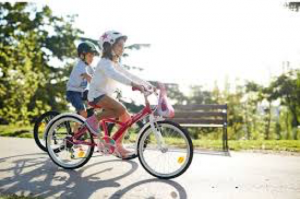What type of exerciser is your child?
Are you really Breathing?
August 19, 2019Are your pain killers making you obese?
October 1, 2019Getting Your Child to Exercise!
As a society I think we are all on the same page when it comes to the importance of activity and exercise to health especially for our kids. Often as a parent the part we find hard is bringing that into reality if your child isn’t naturally that way inclined.
Yet our children are becoming more and more sedentary (Not unlike their parents) Todays blog is designed to give you some reasons for kids to exercise and some ideas to help you make that a reality. If you’d like a refresher on the benefits of exercise they are listed at the bottom of the blog.
What type of exerciser is your child?

Exercise doesn’t need to be formal
Not all children like the same sort of exercise or are motivated by the same thing. It’s difference in us that that make our society diverse and fantastic. it’s important to keep this in mind when encouraging our children to exercise.
There are three fitness personality types:
- The Non-Athlete – Lacks athletic ability and has little to no interest in physical activities.
- Casual Athlete –Shows interest in physical activity but is not a skilled player, can be easily discouraged in competitive physical activities.
- Athlete – Has athletic talent, often shows commitment to an activity or sport.
Many of our formal structures only cater for the Athlete not the casual athlete especially as kids get older. I have noticed a change in younger child focused organisations towards involvement in the last few years which is fantastic.
You need to plan your child’s fitness activities around what type of exerciser your child is. Sending a non-exerciser to football practice won’t cut it. Exercise doesn’t have to be formal. Riding to school, playing tiggy with friends, going on family walks and rides, exploring, dance (formal or at home with young kids, family outings to the zoo, going to the playground, swimming socially or in a club are all forms of exercise. Your non athletes are often very creative or in touch with nature so work that into their exercise. If your kids don’t like auskick, cricket, tennis or netball you will have to think outside the square a bit. We have an epidemic of options in our society which is fantastic. If your child likes animals buy them a dog on the proviso, they walk it. That way you are encouraging responsibility and exercise.
Teenagers
A tough age but exercise here is at least as important as other ages. It is well established depression, anxiety and general mood can be benefited from exercise. Teenagers tend to be social beasts. This is why they are always on their phone and social media. Encourage them to do stuff with their friends like riding down the river or the skate park or whatever they’re into. Get them to ride to things they want to do. Younger kids are always keen to do things with their parents so that is something you can directly involve yourself in, this is not always with teenagers. It takes extra effort to create situations teenagers will be active but it’s very possible.
More Tips for Encouraging Your Child to Exercise

If you are still not sure how to motivate your child to exercise, here are several tips:
- Provide a Good Example – In order to excite your children about exercise, you must be excited. Go out and be active along with your children and find something you both like. Children learn by example. Let’s be honest when we see unhealthy parents we are much more likely to see unhealthy kids. Health runs in families and research has shown us adopted kids tend to take on the health profile of their adopted family as opposed to the genetic family. If you don’t feel you are setting the proper example, then now is a great time to work out plan and allow your children to see your hard work and dedication pay off! The saying “kids are like sponges” is an old one that still rings true. If you begin these habits when your children are very young, they will come to think of being active as fun and a normal part of daily life. If not
- Exercise with your Children – As mentioned above this is a great way to increase the overall health of the family is to exercise together. Motivation has to come from the parents through example. Family physically activities should be scheduled regularly.
- Turn the Television and Video Games Off – Sadly, by the time they graduate from high school, the majority of children will have spent more time playing video games than in school. Set limits on television and video game time for children and be sure to enforce those limits. Enforcing is the key, when the choice of video games or TV is available kids are lots less likely to choose activity. Children have parents for a reason, if they were able to make great choices without guidance they wouldn’t need parents. Don’t be scared to be the parent.
- Make it a Group Activity – Allow and encourage your children to invite a friend to join in on physical activities. Often having a friend along makes the activity more enjoyable for the child.
- Reward your Children for Exercising – Rewards may include a trip to the child’s favourite amusement park, new sports equipment, a new MP3 player or iPod to listen to while exercising, etc.
- Plan Active Activities that Do Not Seem like Exercise – Walking the dog is a good activity. A trip to a nature centre or the zoo could also count as exercise because of the vast amount of walking involved.
- Provide the Proper Nutrition – If your children do not get adequate vitamins and nutrition from their diet, they will not have the energy to exercise. Find healthy supplements for yourself and your kids!
Known benefits of exercise.
There are several benefits of being active for children. These benefits include:
- Children who regularly exercise and participate in sports are more inclined to keep on exercising when they become adults.
- We’ve evolved as hunter gatherers and always moved our bodies. This movement is essential for brain development and learning. Australia is in the middle of an epidemic of developments delay due to kids moving.
- Exercise assists children in reaching and maintaining healthy weights. I don’t know about you but if I don’t exercise, I crave unhealthy food.
- Regular exercise is important in building and maintaining strong and healthy bones, muscles and joints.
- Exercise, such as team sports, is key in the development of interpersonal skills like team building.
- Studies show that children who exercise regularly have better school attendance and perform better academically.
- Regular exercise provides higher self-esteem, improved self-image, and greater confidence.
- Regular exercise delays or prevents the development of several chronic diseases such as diabetes, hypertension, or heart disease.
- Active children experience fewer depression and anxiety symptoms. This is a biggy, movement creates the “Happy” brain chemicals in the body. It’s my
- Exercise helps in the development of motor skills and in my observation resilience.
- This isn’t scientific but movement burns off steam and helps you think clearer. Kids are no different and have at least as busy minds as adults.
